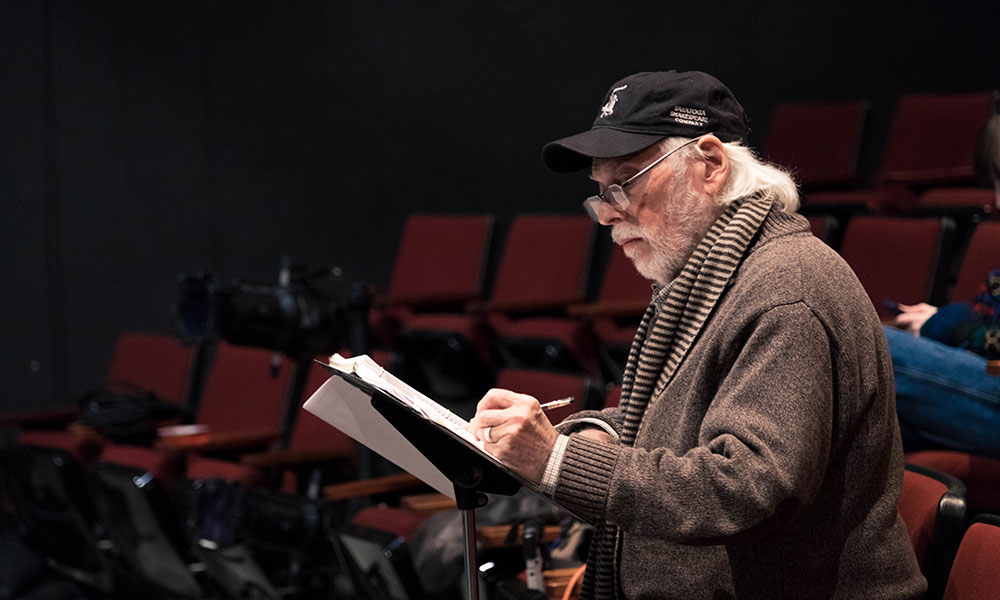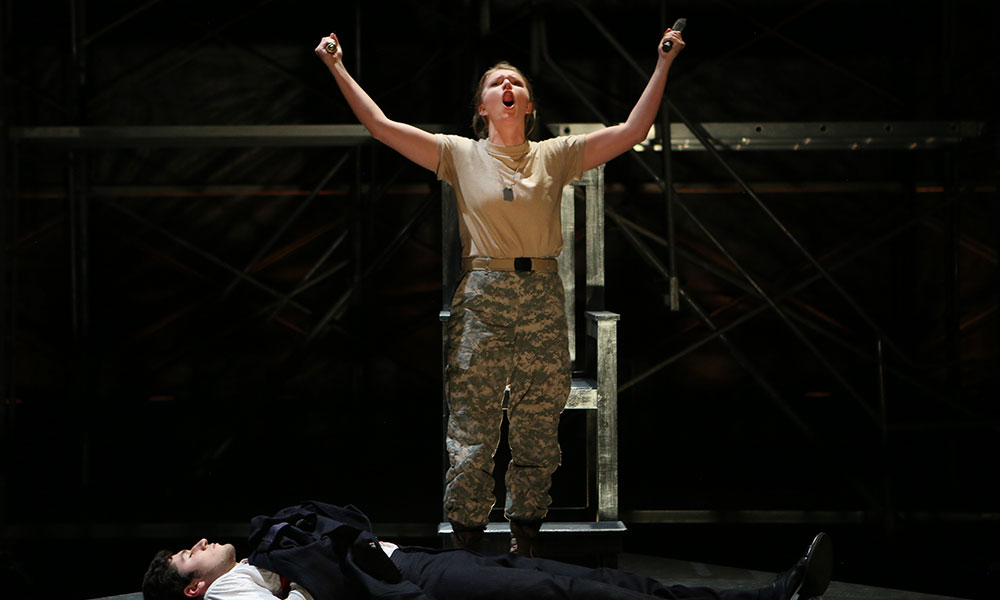Julius Caesar once crossed the Rubicon to conquer Rome—but this time, he’s doing it across the Hudson with an updated wardrobe on the Skidmore College campus. The college’s theater department is staging a 90-minute, contemporary spin on the William Shakespeare classic, Julius Caesar, directed by Skidmore Professor and Saratoga Shakespeare Company veteran Lary Opitz. The play runs through April 22.
A refresher: Shakespeare’s classic tells the tale of the lead-up to and assassination of the charismatic Caesar, an overconfident Roman tyrant, who has the ability to manipulate the masses through rhetoric. Until, of course, he meets a rather bloody end. Save for the assassination angle, I can’t help but draw comparisons between Skidmore’s adaptation and the current state of politics. And thankfully, their interpretation has avoided the pitfalls of turning Caesar into an orange-wigged caricature of President Trump, as did a controversial staging of the play in New York City last summer (Skidmore’s Caesar has dark hair, though his necktie is red). This is a wholly fresh take set in modern times with nontraditional gender casting. The language and drama are as Elizabethan as ever, but instead of togas, senators Brutus and Cassius wear business suits and plot against Caesar using smartphones, while a female Marc Anthony, clad in modern military fatigues and dog tags, barks for war.

It’s all part of an effort to try to highlight the “timelessness of Shakespeare’s iconic work, particularly within our current political climate,” says Professor Opitz. It’s his personal vision to connect a divided, ancient Rome with the suffocating, hyper-partisan air of the present-day United States. It may seem like a bit of a stretch, but Professor Opitz really knows what he’s doing. The veteran Director first began his career acting off-Broadway in 1965, and since then has worked as a director, playwright, stage manager and more in theaters around the globe. I recently talked Shakespeare with Professor Opitz before one of his student company’s rehearsals.
What made you want to adapt Julius Caesar now?
This began in January 2017. After watching the inauguration, I wondered if anybody in our department was doing productions that dealt with the current political situation. When I found out that no one was, I thought maybe I should do that. I’m the Artistic Director of the Saratoga Shakespeare Company, and belong to the Shakespeare Theater Association, where I meet with artistic directors from 150 different Shakespeare companies from around the world. All of the artistic directors were dealing with the same issue: What do we do? How do we respond? So this year, there are many productions of Coriolanus, Richard III and Julius Caesar. I thought, well, whatever the political situation is, Julius Caesar is a good play for us to do at Skidmore.
How would you describe the political climate at Skidmore right now?
That’s hard to say…it’s actually surprising; there doesn’t seem to be a whole lot of discussion among people here. I think there’s a tacit assumption that people aren’t too happy with the present state of affairs, whether that’s directly related to Trump or things in general. But I haven’t heard a lot of arguments on campus. I’m certainly not trying to turn Julius Caesar into Trump, or anyone else. In fact, if anything, Marc Anthony is in some ways the better model. What I’m trying to do is focus on how easily the populace is swayed by personality, rhetoric, charisma, lies and greed, because we see them change—they turn on a dime. They’re persuaded by leaders to go one way or another. And I thought that was appropriate today.

Adapting and condensing Shakespeare’s no easy business. How much of the play did you end up changing?
There are quite a few cuts, mostly at the tail-end of the play, with all of the military scenes. I’ve abbreviated that, because it’s really not to the point in dealing with the mob mentality that takes over. But there rarely is a production of Shakespeare today that isn’t edited in some way or another. And I’ve been doing it for so long it’s almost second nature to cut some scenes or dialogue, or move things around for clarity.
What was the biggest change you had to make setting Julius Caesar in modern times?
It’s fascinating that it doesn’t take a lot. Of course, the language is very different from ours; it’s 400 years old. But I’m convinced that if the actors are absolutely clear on what they’re saying, the audience will understand through context. But that’s certainly the challenge. But it’s amazing how modern the play is, how timeless it is. In fact, there’s a line there again, even though I’m not comparing Caesar directly to Trump, there’s a character who says that if Caesar knifed someone’s mother in the street, he’d get away with it. I’m not quoting it exactly, but we certainly remember Trump’s line about shooting someone on 5th Avenue. And boy, when I heard that come out of an actor’s mouth, I was shocked.
In the end, what do you want people to take away from this adaptation?
It’s interesting, because for a couple of hundred years, what I think is the most important, pivotal scene from the play was cut from it. That was the one featuring the mob, after being stirred up by Marc Anthony, going out and killing someone they thought was the conspirator, Cinna, one of the senators who’d killed Caesar. They instead come across a poet whose name happens to be Cinna. They taunt him and find out he’s not the real Cinna, but they kill him anyway. The implication is that if we’re not well informed or careful about our sources of information—and we’re too likely to accept fake news—we could act inappropriately. If we’re too easily swayed by rhetoric and personality, we could be in great trouble, because we’re not fulfilling our role as citizens in a democracy.


